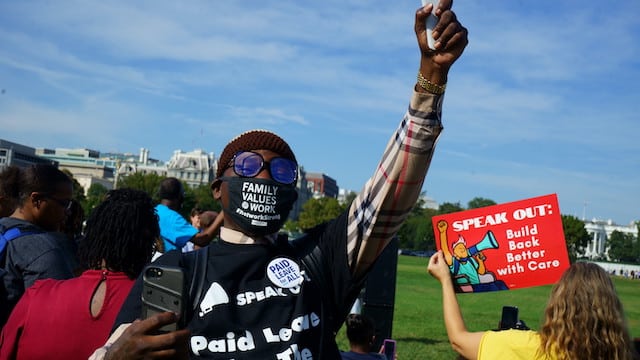Raise Up Massachusetts: Ready to Put Earned Sick Time on the Ballot

They stood in front of Walmart’s, city halls and the State House in a dozen cities across Massachusetts July 24, representing scores of organizations, all with one clear message: ‘We need to Raise Up Massachusetts by enacting earned sick time and a higher minimum wage. And if the legislature doesn’t do it, the voters will.’
“I understand the struggle that people face when they have to choose between taking care of their health when they are sick, or going to work,” said Freddy Reyes, one of the speakers at the statehouse rally in Boston. “I make minimum wage and live from paycheck to paycheck, so I understand the financial strain that comes with missing a day of work. The bottom line is that paychecks need to be able to keep up with the prices, and people need to be able to take care of their health, without being penalized at work.”
The rallies marked the official launch by Raise Up Massachusetts, a statewide coalition of organizations working for earned sick time and an increase in the minimum wage, of their campaign to bring these two measures to the November 2014 ballot.
The kickoff rally at the State House drew workers, parents, faith leaders, elected officials and supporters by the hundreds. Across the state, from Springfield to New Bedford, a series of simultaneous rallies were held at low-wage corporations to share the message that workers will no longer stand for low wages without earned sick time.
Nearly one million people in Massachusetts – almost one-third of the state’s workers – are at risk of losing their jobs and wages their families depend on if they have to stay home to care of themselves or of a sick child. Demonstrators insisted they deserve a better sense of job security and peace of mind by having access to earned sick time.
With passage of a law in New York City, the largest government entity in the Northeast now requires earned sick time for workers. Connecticut passed a bill in 2011.
Good for Public Health and Lowering Health Care Costs
“Providing earned sick time for all workers in Massachusetts has growing support across the nation, and should be put into effect here in Massachusetts,” said Patricia Whynot, a registered nurse in the Surgical Intensive Care Unit at Boston Medical Center. “Earned sick time is for more than just when a person is ill – it is for preventative care to maintain good health as well. When can you go to a doctor’s appointment, eye exam, or annual physical if you can’t get the time off of work? Earned sick time helps workers maintain good health and controls health care costs.”
Boosting the Economy
 Providing earned sick time has been shown to benefit businesses by reducing employee turnover and lost productivity. States and municipalities that have implemented earned sick time have seen job growth, and most employers report no negative impact on their profitability. Economists say that job retention policies such as earned sick time reduce unemployment and strengthen the economy, according to the Center for Economic and Policy Research.
Providing earned sick time has been shown to benefit businesses by reducing employee turnover and lost productivity. States and municipalities that have implemented earned sick time have seen job growth, and most employers report no negative impact on their profitability. Economists say that job retention policies such as earned sick time reduce unemployment and strengthen the economy, according to the Center for Economic and Policy Research.
Small business owners also spoke out in support of these measures. “People should be given time to take care of their well-being,” said Rob Everts of Equal Exchange, based in West Bridgewater. “We have found that by providing employees a few days per year to go to the doctor or take care of their sick child, they are more productive at work, which in turn is good for the business.”
Bills that would provide all workers with earned sick time and increase the minimum wage are currently sitting before the legislature, waiting for a vote.
Basic Protections Include Increasing the Minimum Wage
“The last time that the minimum wage in Massachusetts was increased, George Bush was president,” said Jeannette Wicks-Lim, an assistant research professor at the Political Economy Research Institute at UMass-Amherst. “Since then, the cost of living has risen, making it more difficult for workers and their families to afford the basic necessities. Low wage workers cannot afford to keep losing value in purchasing power when the cost of living rises, but their income does not.”
In his 2013 State of the Union address, President Obama said, “We know our economy is stronger when we reward an honest day’s work with honest wages…For businesses across the country, it would mean customers with more money in their pockets.”
According to research conducted by Mass Budget, an increase in the minimum wage would affect 580,000 workers (nearly one of every five workers) in the Commonwealth by increasing their income. An increase would help workers better support themselves and their families – and would also help local communities and the state’s entire economy by giving workers more money to spend.
“It’s just not possible for me to support myself and my children on this income,” said Melanie Brown. “It’s a daily struggle to meet ends meet, and Massachusetts minimum wage workers are long overdue for financial relief.”
Ready to Go to the Voters
If the legislature rejects the pending bills, on August 7 the final language for the ballot questions will be submitted to the Attorney General. On September 18, the Secretary of State will provide the petition forms to be signed by 200,000 supporters, allowing these two measures to be taken directly to Massachusetts voters.
Massachusetts would be the first state in the country to put earned sick time on the ballot.
For more photos from the rallies, go to http://www.flickr.com/photos/99347399@N07/sets/72157634779297977/
